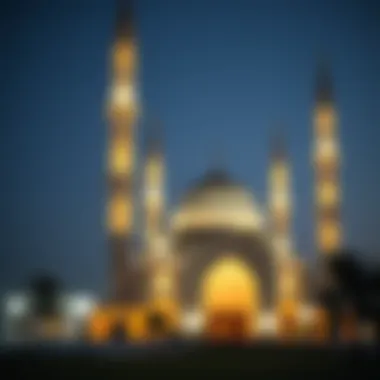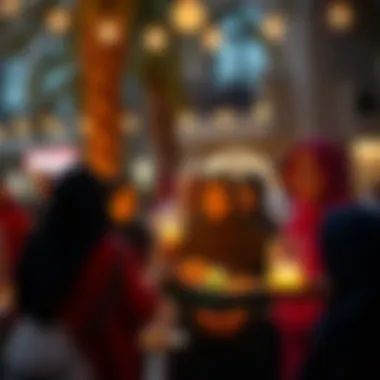Exploring the Significance of Ramadan in the UAE


Intro
Ramadan is more than just a month on the Islamic lunar calendar; it's a period steeped in tradition, reflection, and community spirit that holds a particular resonance in the United Arab Emirates. Understanding how Ramadan unfolds in this vibrant, diverse landscape can offer invaluable insights, especially for homeowners, investors, and expatriates looking to navigate the changing tides of life during this significant time. In the UAE, the sights and sounds during Ramadan transform the bustling atmosphere into a uniquely serene yet lively setting.
As the sun sets, the traditional sound of the adhan calls people to break their fast with a meal known as iftar. Streets come alive with families gathering, friends reconnecting, and community events springing up across various neighborhoods. This festive yet reflective time creates a unique flavor in daily living, which in turn has defined its social and economic landscape.
Whether you’re looking to invest in real estate during this holy month or simply understand how Ramadan influences property dynamics, keeping an eye on market trends is crucial. In this article, we will delve into how the real estate sector adapts during Ramadan, explore current market conditions, and look ahead at what future trends may emerge from this period.
Market Trends
Understanding the rhythm of Ramadan is essential for grasping how the real estate market operates in the UAE during this holy month. Following along, we will examine the current real estate landscape and what the future predictions could tell us about property investments amid the unique challenges and opportunities that Ramadan brings.
Prolusion to Ramadan in the UAE
Ramadan holds a place of profound significance within the United Arab Emirates, not just as a month of fasting, but as a time of community, reflection, and cultural enrichment. Understanding this period is essential for anyone residing in or engaging with the UAE—be it through business, social interactions, or even simple curiosity. In this article, we’ll journey through the intricacies of Ramadan, focusing on its historical backdrop and cultural importance, which shapes the daily lives and practices of individuals and communities alike.
Historical Context
The essence of Ramadan traces back to the early days of Islam when it was instituted as a time for reflection, prayer, and community ties. Originally, it was believed that the Qur'an was revealed to the Prophet Muhammad during this sacred month, an event that lends not only religious significance but also a rich historical narrative that underpins contemporary practices.
In the UAE, the historical context of Ramadan extends beyond its religious origins. The traditions observed today reflect centuries of cultural evolution influenced by the diverse communities that have settled in the Emirates. From the nomadic Bedouins to modern Emirati society, each group has imbued the month with unique practices—marked by the rhythms of deserts, trade, and migration.
This historical timeline is uncomfortable unmarred by trials, wars, and the scenic transitions into a modern, cosmopolitan society. Yet, through it all, the core values of Ramadan remain intact—compassion, solidarity, and spirituality permeating the lives of those who observe the fast. In understanding this history, one appreciates how Ramadan is not just a religious observance but a thread that weaves together the fabric of UAE’s cultural identity.
Cultural Significance
Culturally, Ramadan transforms the atmosphere of the UAE. The month serves as an invitation for people to connect, not just with faith but also amongst themselves. It’s a catalyst for gathering family, friends, and communities. Iftar, the evening meal that breaks the fast, becomes a focal point. Families and neighbors come together to share food and stories, often preparing dishes that have been passed down through generations.
Moreover, Ramadan fosters a sense of shared experience and mutual respect. Many expatriates, despite not observing the fast, partake in events and gatherings open to all. This inclusivity creates an environment where cultural exchange flourishes. It’s not uncommon to find iftar tents set up by local businesses, allowing communities to experience the spirit of giving and generosity that Ramadan inspires.
In terms of business culture, Ramadan can alter working hours and practices significantly. Employers adapt schedules to accommodate fasting, while retail spaces often shift focus towards promoting iftar meals and celebratory events leading up to Eid al-Fitr, the holiday marking the end of Ramadan.
Overall, Ramadan in the UAE represents a convergence of spirituality, community, and commerce—a potent reminder of how deeply interwoven these elements are. As we proceed through this article, we will delve deeper into the practicalities and experiences surrounding Ramadan, shedding light on how it profoundly affects both daily life and the broader socio-economic landscape.
Timing of Ramadan
The timing of Ramadan holds a significant place in the lives of Muslims in the UAE and beyond. It reflects not only the spiritual commitments of the faithful but also how the rhythm of daily life changes during this holy month. This section dives into the intricacies of how Ramadan is timed, providing insights that will help homebuyers, investors, real estate agents, developers, and expatriates understand the broader implications of timing in the context of Ramadan.
Lunar Calendar and Its Influence
Ramadan’s timing is inherently tied to the lunar calendar. This calendar operates on the cycles of the moon, with each month starting with the sighting of the new moon. Each lunar month lasts approximately 29.5 days, meaning Ramadan shifts by about 10 to 12 days earlier each year when compared to the Gregorian calendar.
The impact is multifaceted. For businesses, knowing that Ramadan will occur at different times every year can help in planning promotions and schedules.


"The moon’s phases govern much of life in the Middle East, creating links between faith, culture, and commerce."
Additionally, the lunar calendar is significant in how communities plan their daily routines. For example:
- Meal Timing: Suhoor, the pre-dawn meal, and Iftar, the evening meal break, are thus also influenced by the daily changes in sunset times.
- Prayer Practices: The timing of daily prayers also takes on a new rhythm, with many adding additional prayers which affect communal interactions and engagement.
Determining Start and End Dates
Determining the start and end dates of Ramadan is not an exact science. The Islamic community traditionally relies on moon sightings, adding a layer of anticipation each year. Many UAE residents look toward local religious authorities who announce the official start based on these sightings.
This leads to different interpretations, as other regions might have slightly varied timings based on localized moon sightings. Consequently, establishing the timing for Iftar and Suhoor meals becomes a community activity, fostering a sense of unity among neighborhood families.
When it comes to practical considerations:
- Real Estate Adjustments: Knowing when Ramadan starts can influence rental agreements and property transactions, as the demand often fluctuates during this month.
- Event Planning: Many cultural and community events get organized around the expected dates of Ramadan, affecting networking opportunities for businesses and individuals.
In summary, understanding the timing of Ramadan is pivotal not just for spiritual observance but also for social cohesion and economic planning within the UAE. This month becomes a time where faith, community, and commerce intertwine, creating a nuanced landscape that requires careful navigation and understanding.
Daily Routine During Ramadan
Understanding the daily routine during Ramadan is essential for grasping how this holy month influences life in the UAE. Fasting, spirituality, and community all play vital roles in shaping the day-to-day experiences of individuals and families. As the sun dips below the horizon, not just meals are shared, but a rich tapestry of cultural practices and spiritual reflection unfolds. Ramadan is not just about abstaining from food and drink; it weaves a rhythm that echoes in the hearts of the community, creating connections and fostering personal growth.
Fasting Practices
Fasting during Ramadan holds phenomenal significance for Muslims in the UAE. It’s more than simply refraining from eating between sunrise and sunset; it fosters a sense of discipline, reflection, and empathy for those less fortunate. For instance, the imsaak (the pre-dawn meal) often includes wholesome foods like dates, labneh, and fresh fruits, which prepare individuals for the day ahead. Meanwhile, the iftar (the meal to break the fast) is traditionally initiated with the eating of dates and a glass of water, followed by larger meals with family and friends.
The fasting period encapsulates a blend of spiritual and personal challenges. During daylight hours, energy levels may fluctuate, impacting work productivity and social interactions. This calls for an understanding of personal limits. Employers often adjust work hours, recognizing that employees have different capacities to focus during this month, thus often leading to a reduced workday.
Moreover, fasting cultivates mindfulness around food, often leading to healthier eating habits. Breaking the fast on rich, flavorful dishes, like harissa or shawarma, is not only a culinary delight, it also reinforces communal ties.
Prayer and Reflection
In the hustle and bustle of daily life, Ramadan carves out moments for prayer and reflection. Muslims engage in Salat, or prayer, five times a day, but during Ramadan, they deepen this practice. Night prayers, known as Taraweeh, offer spiritual nourishment, allowing individuals to connect intimately with their faith. Local mosques often brim with worshippers reciting the Qur'an together, engendering a sense of community and shared purpose.
Reflection is an integral part of Ramadan. It encourages individuals to contemplate their deeds, seek forgiveness, and set intentions for self-improvement. The communal atmosphere also promotes check-ins with family and friends, fostering connections that may have waned in daily life's chaos. This communal upliftment can serve as a counterbalance to the challenges that fasting presents.
Community Engagement
Ramadan stands as a beacon of communal spirit in the UAE, drawing people closer together. It promotes acts of charity and kindness, encouraging individuals to reflect on their responsibilities towards others. Initiatives such as Iftar tables set up across the city provide meals for those in need. Likewise, many residents engage in charity, donating to organizations, helping to alleviate hunger and poverty.
The essence of Ramadan also permeates social events. Families host iftar gatherings, bringing together friends, relatives, and even neighbors. These events often spark lively conversations and cultural exchange. Expatriates find camaraderie, as diverse cultures come together to celebrate shared values and traditions.
In essence, the daily routine during Ramadan encompasses an intricate balance of personal discipline, spiritual reflection, and community spirit. It serves as a potent reminder of the importance of compassion, understanding, and togetherness in the hearts of those living in the UAE.


"Fasting is not about being hungry; it's about finding solace in simplicity and deepening our connection with one another."
This blend of fasting, prayer, and community engagement molds the very foundation of life during this holy month, transforming daily living into an enriching experience.
Ramadan and Real Estate
The intersection of Ramadan and real estate is a critical point of discussion in the UAE. As this holy month unfolds, it brings not only spiritual introspection but also tangible shifts in the property market. Many may not realize just how significantly Ramadan influences real estate transactions, rental agreements, and even marketing strategies in the UAE. Expatriates and local investors alike find themselves navigating a landscape that is both culturally unique and economically dynamic.
Impact on Property Transactions
During Ramadan, property transactions tend to slow down somewhat. It's a month dedicated to reflection and spiritual activities rather than, some would say, some intense negotiations. Many buyers and sellers prefer to hold off on major decisions until after Eid al-Fitr. This can lead to a notable dip in activity levels within the market, allowing those who do wish to buy or sell to capitalize on potentially less competitive conditions.
However, this lull in transactions isn’t entirely negative. Some agents find that it offers a gentler pace to reassess strategies and focus on nurturing relationships with clients, which can be beneficial for future engagements. Additionally, certain buyers might leverage Ramadan to snag properties at favorable prices since some sellers may feel urgency to complete transactions before the end of the month. This paradox of slowed activity combined with strategic opportunities makes Ramadan a complex time for real estate.
Adjustment in Rental Market
The rental market sees its own set of shifts during Ramadan. Many landlords might choose to offer reduced rents or promotional packages to attract tenants looking for short-term leases. For expatriates who may only reside in the UAE temporarily, this flexibility can be particularly appealing. Landlords recognize that Ramadan is a time for families to gather, and thus, they often adjust the amenities and terms of leases to attract more residents trying to celebrate the month comfortably.
“In Ramadan, everything changes—housing isn’t just about roofs and walls, it’s about creating homes for shared meals and prayers.”
The demand for properties that include suitable facilities for Iftar gatherings often rises, prompting owners to reconsider how they present their properties. Features such as large kitchens or communal spaces become essential selling points. Furthermore, expats seeking to relocate during this time primarily look for areas steeped in culture or connected to community events, thus directly impacting rental trends.
Seasonal Offers and Promotions
Ramadan presents a prime opportunity for real estate agencies and developers to introduce seasonal offers and promotional packages aimed at homebuyers and renters. Several companies might launch special Ramadan campaigns that encompass bonuses for working with them, such as waiving fees or including special financing options for buyers.
Many developers capitalize on this spirit of generosity, creating attractive payment plans or early bird discounts for properties. For instance, leading real estate companies have been known to partner with local businesses to provide additional incentives like discounts at nearby stores or even community events, enhancing the value for buyers.
These promotions are not only about boosting sales—they're about fostering community ties and honoring the traditions inherent in Ramadan. The importance of giving, sharing, and building community mirrors the essence of residential living, making such seasonal offers resonate more deeply with potential buyers.
Cultural Celebrations
Cultural celebrations during Ramadan play a pivotal role in shaping the community’s social fabric within the UAE. These events not only mark an observance of faith but also serve to unite individuals, foster goodwill, and promote cultural heritage. They create a lively atmosphere where people from various backgrounds come together to partake in festivities, strengthening societal ties amidst the sacred month.
One significant aspect of these celebrations is the iftar gatherings, where families, friends, and even strangers come together to break their fast at sunset. Sharing a meal, often featuring traditional dishes such as dates, lentil soup, and biryani, emphasizes the values of generosity and hospitality that are integral to the culture. These gatherings are more than just about food; they provide a moment for connection, deliberating relationships, and creating memories that bind the community. People prioritize these meals to reflect on their day’s fasting experience and the importance of gratitude.
Moreover, these sessions often extend beyond the walls of homes to larger venues, such as community centers, mosques, and public parks. Various organizations and charities also arrange large-scale iftar events. Such initiatives not only invite locals but also expatriates to join in the collective experience, making it inclusive.
Another significant element of cultural celebrations during Ramadan is the community initiatives that crop up throughout the month. Many organizations and groups devise plans to uplift those in need, showcasing the spirit of compassion and aid. This could mean offering food supplies, clothing drives, or even hosting educational sessions about Ramadan itself. Thus, those who participate often find a sense of purpose, contributing to a larger cause.
- Community Effectiveness: These initiatives showcase how the UAE manifests its commitment to social responsibility, reflecting a broader understanding of community engagement beyond mere celebrations.
- Participation Across Cultures: Events may also feature performances that include music, poetry, and art, which often represent various cultures coexisting harmoniously within the UAE. They are an excellent avenue for dialogue—a means to transcend barriers and celebrate diversity.
Collectively, these cultural celebrations during Ramadan synthesize a sense of belonging and societal connection. They underline the values of sharing, community involvement, and inclusivity, ultimately enriching the social tapestry of the UAE.


Challenges During Ramadan
During Ramadan, the observance of fasting and heightened spirituality brings both benefits and challenges. The month, revered for its reflection and communal ties, also imposes unique stressors on individuals and the community. This section delves into those challenges, exploring how they can affect not just the personal but also social, economic, and professional aspects of life in the UAE.
Health and Wellbeing Considerations
Fasting from dawn to dusk has profound spiritual significance, yet it also raises various health challenges. Many people face issues such as dehydration, fatigue, and headaches during Ramadan, primarily due to the dramatic change in daily meal patterns and energy consumption.
- Hydration: The biggest hurdle is maintaining adequate hydration. As the temperatures can soar in the UAE, especially in summer months, individuals often find hydration difficult. During non-fasting hours, there's a tendency to drink large quantities of water too quickly, which can lead to discomfort and health issues. Better practices involve sipping fluids gradually as soon as the fast breaks and continuing throughout the night.
- Nutritional Balance: Many iftars might emphasize traditional foods that can be rich and heavy, contributing to digestive issues. A balance of proteins, carbohydrates, and healthy fats is crucial. Failing to maintain such a balance might lead to impediments in daily routines and overall wellbeing, exacerbating the impacts of fasting fatigue.
- Mental Health: The psychological weight of fasting shouldn’t be overlooked. The combination of sleep deprivation, changes in eating habits, and social pressures can lead to increased stress and anxiety for some. Those who might have pre-existing mental health issues should look for support systems during this time.
Moreover, community engagement programs often organize health workshops aimed at addressing these health challenges, emphasizing preventive measures and sharing practical tips for staying healthy while observing fasts.
Work-Life Balance
The Ramadan month often results in shifts in professional expectations and duties. In the UAE, it is common for working hours to be shortened, creating both opportunities and potential pitfalls for employees.
- Flexibility in Work Hours: While reduced hours can seem like a bonus, they can also increase pressure. Deadlines may not adjust accordingly, leaving employees scrambling to complete tasks during tight time windows. It's essential for employers to foster a supportive environment to alleviate this pressure.
- Cultural Sensitivity: The cosmopolitan nature of the UAE brings together a multitude of cultures, and respecting the sacredness of Ramadan is vital. Non-Muslim colleagues might need guidance on how to approach fasting colleagues, fostering a respectful workplace atmosphere. Learning key phrases such as "Ramadan Kareem" can go a long way in promoting understanding.
- Social Events: Work events often adjust during Ramadan. On one hand, many companies host iftar gatherings, promoting team bonding; on the other hand, there's sometimes a reluctance. Many employees may prefer quiet times for reflection over lively gatherings, which can lead to divisions or disconnect in social dynamics within a workplace.
Future Perspectives
Exploring the future perspectives of Ramadan in the UAE sheds light on how changing social dynamics and globalization are reshaping this vital religious observance. There is a rich interplay of tradition and modernity in the UAE, demonstrating how Ramadan will likely evolve while still maintaining its core essence. This section presents insightful considerations for various stakeholders, including homebuyers, investors, real estate agents, developers, and expatriates, underscoring the implications and adaptations required amidst this evolution.
Evolving Traditions
The traditions surrounding Ramadan are not carved in stone. As generations pass, particularly in a cosmopolitan society like the UAE's, these practices may change. For instance, traditional Iftar gatherings often now blend cultural cuisines from diverse backgrounds, reflecting the multicultural fabric of the UAE. We see local Emirati dishes being served alongside popular international fare such as sushi and pasta.
Moreover, technology has ushered in a new age during Ramadan. Apps designed for Quran recitation or prayer schedules have gained popularity, catering to both local citizens and expatriates. These tools not only enhance spiritual practice by making it accessible but also demonstrate how traditional observances are adapting to contemporary lifestyles.
"Tradition gives you roots; modernization gives you wings."
This evolution is also visible in community services. Various organizations sponsor social initiatives during Ramadan, like food drives and fundraising appeals, which in turn strengthen community bonds. These activities have only gained momentum as social media campaigns encourage participation. The shift towards inclusivity, marked by invitations extended to all communities to join Iftar meals, reveals a more united approach to celebrating this holy month.
Impact on Dubai's Growth
Dubai's growth trajectory is closely linked to Ramadan, especially in how the city transforms during this period. Economically, businesses prepare for seasonal booms, particularly in the hospitality and retail sectors. Restaurants experience increased patronage during Iftar, and retailers typically roll out special promotions to align with consumer spending patterns during Ramadan.
Additionally, the construction and real estate markets adapt as investments in community centers and mosques surge to cater to the growing population during Ramadan. Homebuyers often seek properties that provide easy access to amenities catering to Ramadan needs: reliable supermarkets for food preparation, nearby mosques, and peak leisure activities in the evenings after fasting.
Cultural and economic initiatives introduced during Ramadan, therefore, play a critical role in Dubai's ongoing development. By embracing a blend of tradition and modernity, Dubai is not just a city of the future; it’s a city that respects its past while welcoming the changes of tomorrow.
Culmination
The conclusion of this article underscores the significant role that Ramadan plays in the United Arab Emirates, both culturally and economically. Throughout this exploration, the various aspects of Ramadan—from its historical roots to the observed practices during this holy month—have been laid bare for readers. Understanding these dimensions sheds light on how deeply intertwined Ramadan is with the social fabric of UAE.
Summarizing Ramadan's Importance
Ramadan is more than just a month of fasting; it is a period rich with cultural reflection, community bonding, and spiritual awakening. Here are several key points illustrating its importance:
- Cultural Relevance: Ramadan has deep cultural implications that transcend religious practices, affecting how families interact and celebrate together. Festivals, traditions, and gatherings are a commonplace occurrence, emphasizing unity.
- Economic Impact: The month shapes the economy, particularly in sectors like retail and hospitality. Special promotions and increased demand for services during this period signal just how integral Ramadan is to revenue generation.
- Social Cohesion: Iftar gatherings illustrate how Ramadan fosters a sense of belonging within the community. Amidst the daily fast, people come together to break bread, fortifying social ties and enhancing the spirit of generosity.
- Personal Growth: For many, Ramadan serves as a time for self-reflection and growth. It encourages individuals to practice discipline, empathy, and gratitude.
In summary, understanding the significance of Ramadan is essential for everyone in the UAE—homebuyers, investors, real estate professionals, and expatriates alike. This month is a tapestry woven with rich traditions, economic nuances, and community values, all of which are crucial for anyone looking to engage with the local culture meaningfully. As the UAE evolves, so too will the interpretations and manifestations of Ramadan, reminding us that its core values remain timeless, just like the crescent moon that heralds its arrival each year.



